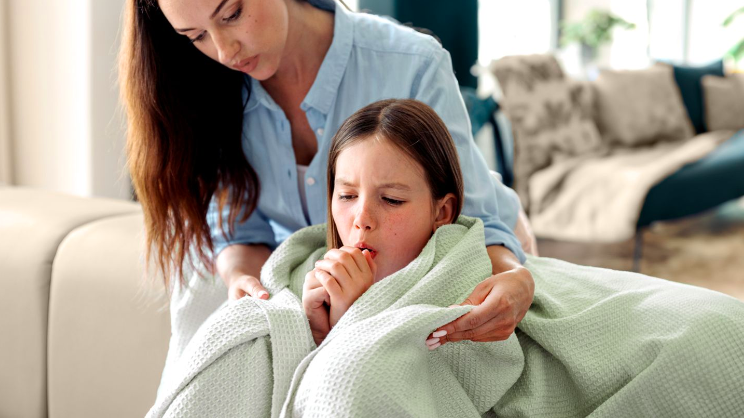Health
How Monkey Pox Is Diagnosed: Tests and Procedures

Last Updated on April 24, 2023 by Nurse Vicky
How Monkey Pox Is Diagnosed: Tests and Procedures
Monkeypox is a rare viral disease that is similar to human smallpox, but less severe. The disease is caused by the monkeypox virus, which is found in Central and West African countries.
Monkeypox can be transmitted to humans through contact with infected animals, such as monkeys and rodents, or through contact with the body fluids of infected humans.
In this article, we will discuss the tests and procedures used to diagnose monkeypox.
Symptoms of Monkeypox
Monkeypox symptoms can take anywhere from 5 to 21 days to appear after infection. The initial symptoms are similar to those of flu, including fever, headache, muscle aches, and backache. Other symptoms that may appear include:
- Rash, which often begins on the face and then spreads to the rest of the body
- Swollen lymph nodes
- Chills
- Fatigue
- Sore throat
- Cough
- Shortness of breath
- Nausea and vomiting
Physical Examination: If you suspect you have monkeypox, you should see a doctor immediately. The doctor will perform a physical examination to check for symptoms such as rash, swollen lymph nodes, and fever. They will also take a medical history, including information about recent travel and exposure to animals.
Laboratory Tests: Laboratory tests are used to confirm the diagnosis of monkeypox.
The following tests are commonly used:
- Polymerase Chain Reaction (PCR) Test: This test is used to detect the monkeypox virus in a sample of blood, pus, or other bodily fluids.
- Enzyme-Linked Immunosorbent Assay (ELISA) Test: This test detects the presence of monkeypox antibodies in the blood.
- Viral Culture: This test involves growing the monkeypox virus in a laboratory from a sample of infected tissue or fluid.
- Electron Microscopy: This test uses a microscope to look for the monkeypox virus in a sample of infected tissue or fluid.
- Differential Diagnosis: Monkeypox can be easily confused with other diseases that have similar symptoms, such as chickenpox, measles, and smallpox. To rule out these diseases, doctors may perform additional tests, including a skin biopsy, chest x-ray, and blood tests.
Treatment for Monkeypox: There is no specific treatment for Monkeypox. Treatment is focused on relieving symptoms and preventing complications.
If diagnosed early, the antiviral drug, cidofovir, may be used to treat monkeypox. Additionally, infected individuals should be isolated to prevent the spread of the disease. Prevention of Monkeypox Prevention is key to avoiding monkeypox.
The following measures can help prevent infection:
- Avoid contact with animals that may carry the virus, such as monkeys, rodents, and squirrels.
- Wear protective clothing, such as gloves and masks, when handling animals or their body fluids.
- Wash your hands frequently with soap and water.
- Get vaccinated against smallpox, as the vaccine may provide some protection against monkeypox.
FAQ’s
How is monkeypox spread?
Monkeypox is spread through contact with infected animals or humans.
What are the symptoms of monkeypox?
The symptoms of monkeypox include fever, headache, muscle aches, rash, swollen lymph nodes, chills, fatigue, sore throat, cough, shortness of breath, nausea and vomiting.
How is monkeypox diagnosed?
Monkeypox is diagnosed through laboratory tests, including the polymerase chain reaction (PCR) test, enzyme-linked immunosorbent assay (ELISA)
There is no specific treatment for monkeypox, but symptoms can be managed with medications such as antihistamines and pain relievers.
How can monkeypox be prevented?
Monkeypox can be prevented by avoiding contact with infected animals and their body fluids, washing hands frequently, wearing protective clothing when handling animals, and getting vaccinated against smallpox.
Is monkeypox contagious?
Yes, monkeypox is contagious and can be spread through contact with infected animals or humans.
Conclusion
monkeypox is a rare viral disease that can have serious consequences if left untreated. Early diagnosis is key to preventing the spread of the disease and managing symptoms. If you suspect you have monkeypox, it is important to seek medical attention immediately.
Preventive measures such as avoiding contact with infected animals, washing hands frequently, and getting vaccinated can help reduce the risk of infection. By following these guidelines, you can protect yourself and others from this potentially deadly disease.
Health
7 Fascinating Facts About Magnesium You Probably Didn’t Know

7 Fascinating Facts About Magnesium You Probably Didn’t Know
Magnesium is one of the most essential minerals for our health, yet many people are unaware of its significance.
This vital nutrient plays a crucial role in numerous bodily functions, from energy production to maintaining a healthy heart.
In this article, we will delve into seven intriguing facts about magnesium that may surprise you and help you appreciate its importance in your daily life.
What is Magnesium?
Magnesium is a naturally occurring mineral found in various foods and is vital for human health.
It is the fourth most abundant mineral in the body and is involved in over 300 biochemical reactions.
Magnesium contributes to nerve function, muscle contraction, blood sugar control, and blood pressure regulation.
It can be obtained from various dietary sources, including leafy greens, nuts, seeds, whole grains, and legumes.
1. Magnesium is Involved in Energy Production
Did you know that magnesium is essential for converting food into energy? This mineral plays a critical role in the activation of ATP (adenosine triphosphate), the energy currency of our cells.
Without sufficient magnesium, your body struggles to produce energy effectively, which can lead to feelings of fatigue and weakness.
How Does It Work?
ATP production occurs in the mitochondria, often referred to as the powerhouse of the cell.
Magnesium helps activate enzymes involved in this energy production process, ensuring that your body has enough energy to perform daily activities.
2. A Key Player in Bone Health
Magnesium is vital for maintaining strong and healthy bones. Approximately 60% of the magnesium in your body is stored in your bones.
It contributes to bone density and strength by regulating calcium levels in the body, which is crucial for bone formation.
The Calcium Connection
Calcium is often touted as the primary mineral for bone health, but magnesium plays an equally important role.
An imbalance of these two minerals can lead to bone-related issues such as osteoporosis.
Ensuring adequate magnesium intake is essential for maintaining optimal bone health.
3. Supports Heart Health
Magnesium is a crucial mineral for cardiovascular health. It helps maintain normal heart rhythms and can reduce the risk of heart disease.
Adequate magnesium levels are associated with lower blood pressure and reduced risk of heart attacks.
Regulation of Blood Pressure
Magnesium helps relax blood vessels, which can lead to lower blood pressure.
Studies have shown that individuals with higher magnesium intake tend to have better cardiovascular health. Including magnesium-rich foods in your diet can be an effective strategy for supporting heart health.
4. Magnesium and Mental Health
Emerging research suggests a strong link between magnesium levels and mental health.
Magnesium plays a role in regulating neurotransmitters, which are essential for mood stabilization.
Low magnesium levels have been associated with an increased risk of depression and anxiety.
Cognitive Function
Magnesium may also enhance cognitive function. Studies have indicated that adequate magnesium intake can improve memory and learning abilities.
This mineral is essential for brain health, making it vital for overall mental well-being.
5. Magnesium Deficiency is Common
Despite its importance, magnesium deficiency is surprisingly common.
Factors such as poor diet, chronic stress, and certain medical conditions can lead to low magnesium levels.
Symptoms of magnesium deficiency can include muscle cramps, fatigue, and irritability.
Risk Factors for Deficiency
Certain populations are at a higher risk for magnesium deficiency, including the elderly, those with gastrointestinal diseases, and individuals who consume a diet low in whole foods.
It’s essential to recognize the signs of deficiency and consider increasing your magnesium intake through diet or supplements if necessary.
6. Natural Relaxant
Magnesium is often referred to as a natural relaxant due to its calming effects on the nervous system.
It helps regulate cortisol levels (the stress hormone) and promotes relaxation, making it beneficial for those dealing with anxiety and stress.
Improving Sleep Quality
In addition to its relaxing properties, magnesium can improve sleep quality.
Many people find that magnesium supplements help them fall asleep faster and stay asleep longer, making it a popular choice for those struggling with insomnia.
7. Magnesium in Sports Performance
Athletes and active individuals often benefit from magnesium’s role in muscle function and recovery.
Magnesium helps prevent muscle cramps and can aid in post-exercise recovery by reducing inflammation and promoting relaxation.
Enhancing Athletic Performance
Research has shown that adequate magnesium levels can enhance athletic performance.
It is involved in muscle contraction and relaxation, making it essential for peak performance during exercise.
Conclusion
Magnesium is a powerhouse mineral that plays an essential role in various bodily functions. From supporting energy production to promoting heart health and mental well-being, its importance cannot be overstated.
Ensuring adequate magnesium intake through a balanced diet rich in whole foods can significantly enhance your overall health and quality of life.
If you suspect you may be deficient in magnesium, consider consulting with a healthcare provider to assess your levels and discuss dietary changes or supplements that may be beneficial.
FAQs about Magnesium
1. What are the best dietary sources of magnesium?
The best sources of magnesium include leafy green vegetables (like spinach), nuts (especially almonds and cashews), seeds (such as pumpkin seeds), whole grains (like brown rice and quinoa), and legumes (like beans and lentils).
2. How much magnesium do I need daily?
The recommended daily intake of magnesium varies by age and gender. Generally, adult men should aim for about 400-420 mg per day, while adult women should aim for about 310-320 mg.
3. Can I take magnesium supplements?
Yes, magnesium supplements are available and can be beneficial, especially for individuals who may not get enough from their diet. However, it’s essential to consult with a healthcare provider before starting any supplement regimen.
4. What are the symptoms of magnesium deficiency?
Symptoms of magnesium deficiency can include muscle cramps, fatigue, weakness, irritability, and irregular heart rhythms. If you experience these symptoms, consult a healthcare professional.
5. Is it possible to get too much magnesium?
Yes, while magnesium from food sources is generally safe, excessive supplementation can lead to toxicity, causing symptoms like diarrhea, nausea, and abdominal cramping. Always consult a healthcare provider before increasing your magnesium intake significantly.
References:
Health
Whooping Cough: Understanding Its Resurgence and Prevention

Health
The Power of Beans: Why This Superfood is a Nutritional Treasure
-

 Trending Stories1 year ago
Trending Stories1 year agoCDC: 1 in 4 Americans Still COVID-Free by End of 2022
-

 Health5 years ago
Health5 years agoMeghan Trainor Shares Motivational New Song ‘Blink’
-

 Health6 months ago
Health6 months agoHow Do Pawpaw Seeds Support Cardiovascular Health?
-

 Health2 years ago
Health2 years agoHow Long Does Monkey Pox Last Before It Surfaces in the Body?
-

 Health3 years ago
Health3 years agoWhat Causes Swollen Body? Understanding Edema and its Triggers
-

 Health3 years ago
Health3 years agoNutrition and the Importance of a Fitness Program – 3 Things to Know
-

 Health3 years ago
Health3 years ago5 Weird Reasons Why Pimples Disappear After Marriage
-

 Health2 years ago
Health2 years agoHealth Benefits Of Pawpaw Seed? 7 Things To Know






